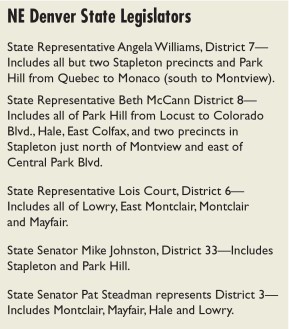 The 2014 legislative session brought changes that Coloradans will see in their kids’ school funding, internet purchases, foreclosure proceedings, broadband for rural areas, regulation of marijuana edibles, and even emergency care for injured pets.
The 2014 legislative session brought changes that Coloradans will see in their kids’ school funding, internet purchases, foreclosure proceedings, broadband for rural areas, regulation of marijuana edibles, and even emergency care for injured pets.
NE Denver Legislators’ Bills From the 2014 Session:
School Finance
“The Student Success Act is the most significant investment in public education since I’ve been in the legislature,” says Senator Mike Johnston, who worked together with Sen. Pat Steadman on school finance this year. “It puts more than $400 million back into K-12. It has a lot of the components we tried to accomplish with Amendment 66, including dollars for: early literacy, retaining and keeping great teachers, support of school programs that were cut during the recession, and early literacy intervention. It also includes targeted dollars for English language learners, charter schools, and full financial transparency so folks know how their tax money is spent. The bill had bipartisan support, with 33 out of 35 votes in the Senate.
“Amendment 66 was about $1.1 billion, and this was about $400 million, but we’re looking at about $400 per student in every Denver public school. For a classroom with 30 kids in a class, that’s $12,000 into that one classroom from this investment.
“What’s missing that would have been covered by Amendment 66 is full day kindergarten for every child, early childhood education for all 3- and 4 year-olds, it would have made possible for schools to do extended days or extended school years if they wanted to, bonuses for highly effective teachers, and more funding for students at risk and living in poverty—so there were a lot of things we weren’t able to do.”
Marketplace Fairness & Small Business Protection Act
Three of our NE legislators, Reps. Court and Williams and Sen. Johnston worked on this bill to help level the playing field between internet businesses and brick and mortar businesses. Local stores pay property tax as well as sales tax, but many internet companies have not, in the past, collected sales tax. Local stores have found people come in and try on shoes, for example, to find what they like, then order them online and pay less because there’s no sales tax—putting local companies that support our economy at a disadvantage. Colorado has always had a law that consumers owe sales tax, and technically they should keep track of all internet purchases made with no tax and pay sales tax on them on a tax return at the end of the year—though few people do that.
This new law now allows the Department of Revenue, in many cases, to make a presumption that internet companies selling to Coloradans owe sales tax and the burden of proof is on the companies to prove they have no “nexus” in Colorado (no connection like a distribution centers, warranty services, etc.)
“It was a little bit frustrating for us,” says Rep. Court, “because the Retail Council, which is historically a Republican kind of group, lobbied very heavily for it but none of the Republians would support it.”
Foreclosure
Rep. McCann sponsored a bill that requires public trustees to refund overpayments directly to borrowers rather than lenders—which ensures that borrowers only pay what they owe on their mortgages.
Rep. McCann also sponsored a bill that prohibits “dual tracking” in which a lender negotiates a loan modification with a borrower while simultaneously pursuing a foreclosure. The bill also requires a lender to establish a single point of contact for borrowers during foreclosure proceedings.
Rep. Williams sponsored a bill that extends the state’s foreclosure deferment program, which was scheduled to sunset at the end of this year. Under the program, county public trustees are required to delay the scheduled sale of a foreclosed property for up to 90 days for homeowners who meet certain eligibility requirements
Broadband for rural areas
“Passing the five telecommunications updates is a big stride on the telecommunications front, not only for telecommunications providers in our state, but also for consumers,” says Rep. Williams. “These laws have not been updated for over 20 years—and you know how fast technology changes. So we’re trying to catch up with technology and our telecommunications laws for 20 years.”
One of the bills repurposes money from a fee collected on phone bills to use it for broadband instead of phone lines. Williams says this will offer economic benefits to rural businesses who can now get broadband service, as well as benefits to rural schools and hospitals.
Emergency Care for Injured Pets
Reps. McCann and Court sponsored a bill that allows emergency medical service providers to provide emergency veterinary care in certain circumstances (to be determined by fire district, city, etc), if the provider has completed the needed training to offer such care.
Marijuana edibles bill
This bill by Sen. Mike Johnston regulates Marijuana edibles so that they are all recognizable, even when they’re out of the package, so you don’t have gummy bears or cookies or Swedish fish that are marijuana laced but people don’t know it when they eat them or see them at a party in a snack bowl.
Other bills
Sen. Johnston passed a bill that extends the statute of limitations for a hit-and-run from five years to 10 years.
Rep. McCann passed a bill that helps prevent prescription drug overdose through a system in which providers will be notified if their patients are obtaining narcotic drugs from a number of different hospitals or doctors and try to get them help.




0 Comments